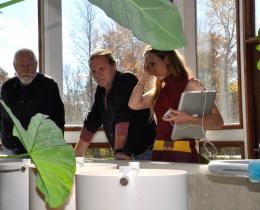Omega: What’s the state of groundwater withdrawal globally?
Maude: NASA just put out a report. Of the 37 major aquifers in the world, 21 are deeply stressed to the point of very serious water displacement. The statistics are very terrifying. We are doubling our exploitation of groundwater every 20 years.
We are taking water from rivers, lakes, and particularly now groundwater aquifers, and moving it to produce commodities. If you ship those commodities out of the watershed, you’re not just shipping the commodity but also the water it took to produce it. We don’t have our eye on that.
We also need to imagine that a very large body [of water] can be depleted. The Aral Sea was the fourth largest lake in the world at one point. Lake Chad was the sixth largest lake. And now they’re both basically gone. You can destroy a great body of water. This same study I mentioned above, said that if the water takings around the Great Lakes are as relentless as they are globally, the Great Lakes could be bone dry in 80 years.
Omega: Can you give an example of places where we are removing too much water from the ground?
Maude: In the United States, the Ogallala Aquifer is in deep trouble. There are 200,000 bore wells going all the time, 24 hours a day. The Department of Agriculture said a couple of years ago they couldn't save the aquifer. They put out a statement saying it was too late to save it. It’ll be gone in 50-60 years. I don’t think people have any idea what that means. It means you just run out of water. It happens so quickly that it’s breathtaking. [Editor's note: Earlier in 2015, the USDA began investing $6.5 million to help conserve water in the Ogallala Aquifer region.]
In California, I think people are going to move. I can’t imagine what else will happen. I don’t know how people, especially people who have a certain lifestyle and expectations about that, will be happy staying there with the water rations. The government, while it’s taken measures, hasn’t taken proper measures in terms of industrial farming and the water used for the export of almonds and many other crops that don’t have to be grown in California. California certainly won’t be able to maintain the level of food production that it has in the past.
The most important example in the world is Brazil. Brazil until recently was considered the most water wealthy country in the world. They built a whole industry of sugarcane ethanol exports based on this perception that they had unlimited amounts of water.
Now, for the first time in recorded history, they have massive droughts, particularly down in São Paolo. Greater São Paolo has 40 million people. They have no water for them. Their aquifers, their reservoirs are gone. They’re talking about moving millions of people. For many many people in São Paolo there’s rationing. They get a little bit of water in the morning, more water comes out of their tap in the evening, and that’s all the water they get.
The reason is partly the overuse of their aquifers for sugarcane ethanol, for soybean ranching, and so on. But it’s also because they’ve cut down the rainforest. What we know about rain forests is that they create what are called flying rivers. These are currents that carry massive amounts of moisture. When you cut down the rain forest this moisture goes down, these flying rivers disappear. Regularly you could count on rain a certain time every year, because of the cycle, because of the health of the rain forest. Now the rain forest is gone and the cycle has been broken.
Omega: Can you explain the different ways water is being privatized?
Maude: Privatization can happen in many ways. It’s often kind of a creeping thing.
One type is bottling water. You are taking water from the water commons, in many cases not paying or not paying much for it. Private companies get to access our public water and sell it back to us at a thousand times what it costs them to process it.
We also privatize by allowing private utilities to come in and run our water services. Our drinking water and wastewater services are given over to companies that say they can do it cheaper. What we know from study after study is that they cut corners, they cut the workforce, they raise the rates of water. It’s one of the reasons we start seeing cut offs because people can’t pay the new rising rates.
Water is also privatized when it’s traded. You have water trading schemes in countries like Australia and Chile. States like Texas and California are also allowing water trading.
You can also privatize water by land and water grabs. An area three times the size of Great Britain has been bought up in Africa by foreign investors. They can claim they own the water, too.
Something new is water pollution trading. This is like carbon markets, only in the form of water. You continue to have the right to pollute if you trade with someone else and they clean up their water for you. You pay them to clean up their water.
Omega: Are there any water success stories you can point to?
Maude: We still have water. We still have clean water. We still have lots of public water. If we can work together to protect the world’s water, I do think it could be a project that could start to bring humanity together in a different way. There are already examples of this, of communities coming back to life because they brought water back to their community.
There’s one wonderful story in Slovakia that recovered thousands of acres of dead land, from bad farming practices, from industrialization and pollution, bringing it back using ancient techniques, growing the right kinds of grasses, all of the things that we know, building small (not large) dams to bring the water back, collecting rainwater.
There’s another one outside of Adelaide, Australia, where they greened the desert by building grassland and wetland to collect the rain, putting the stormwater and the sewage water in to be cleaned by the plant life. Now they have fountains and all the birds have returned.
Omega: How should we be thinking about water?
Maude: I want us to start being conscious of water, revering water. All ancient religions and all indigenous cultures worship water. They understand the water cycle and how tremendously important it is to us. If you get an indigenous leader opening a conference with a prayer, they talk about the healing power of water. We need to bring that back into our lives.



